A Banner Year for Endowment Growth at the Black Colleges
The National Association of College and University Business Officers reports that from July 1, 2006 to June 30, 2007, the typical college endowment fund increased its value by 17.2 percent. The universities with the largest endowments of over $1 billion did even better. They posted an average growth of 21.3 percent.
The historically black colleges and universities traditionally achieve smaller than average gains in their endowment funds. But for this year at least, many of the historically black colleges and universities outperformed the nation’s wealthiest universities in endowment growth. Howard University continues to have the largest endowment of any black college or university. As of June 30, 2007, its endowment stood at $523,690,000. This was a whopping increase of 23.5 percent from a year earlier.
Hampton University in Virginia had endowment resources of $257 million as of June 30, 2007. This is the third-largest endowment among the black colleges. Hampton’s endowment grew by 18.1 percent from the earlier year. This bested the national average.
Several other historically black institutions in the NACUBO survey outperformed the nation’s wealthiest institutions. This year the Morehouse School of Medicine endowment grew 22.3 percent to $56.4 million. Bethune-Cookman University saw its endowment increase by nearly 21.2 percent in the July 1, 2006 to June 30, 2007 period. Virginia State University posted a 23.5 percent increase in endowment value over the past year.
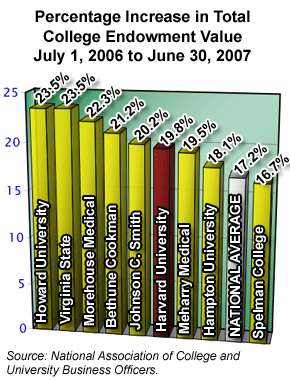

NORTH AMERICAN COUNCIL FOR ONLINE LEARNING (NACOL)

Registration is now open for the Virtual School Symposium (VSS) 2008
The North American Council for Online Learning (NACOL) is pleased to announce that registration is now open for the Virtual School Symposium (VSS) 2008. This year's conference will take place October 26-28, 2008 in Phoenix, Arizona. The VSS theme is: "Bridging the Gap through Online Learning"
The VSS 2008 Program Committee is now accepting proposals for presentations at the conference. The deadline for submitting proposals is March 31, 2008. To download the directions and application, please visit: http://www.virtualschoolsymposium.org/rfp.php or go through NACOL’s website at http://www.nacol.org.
The VSS brings together more than 1200 education leaders from national, state, district, private and other programs together at the industry’s leading event in K-12 online learning. The VSS conference provides important networking opportunities, access to expertise and analysis, trends, research and thought-provoking sessions for leaders looking to help shape the future of education.
Early bird registration discounts are available for a limited time! NACOL members can register by Sept. 15th for only $369.
About NACOL
The North American Council for Online Learning (NACOL), founded in September 2003, is the international K-12 non-profit organization representing the interests of administrators, practitioners and students involved in online learning in the United States, Canada, Mexico, and abroad.NACOL’s mission is to increase educational opportunities and to enhance learning by providing collegial expertise and leadership in the K-12 online teaching and learning marketplace. The association strives to achieve this mission by leading initiatives to conduct research to enhance quality K-12 online learning; encourage collaboration among practitioners in the online learning marketplace; and promote the success and effectiveness of online learning. NACOL offers monthly Teacher Talk Webinars on the third Thursday of each month at 6:00 p.m. (Eastern). Registration available with member and non-member pricing to individuals and institutions.

Amherst College Achieves a Record Number of Black Applicants
 Last fall, Amherst College, the highly regarded liberal arts institution in western Massachusetts, ranked first in the JBHE annual survey of black freshmen at the nation’s 30 leading liberal arts colleges. Since that time Amherst has eliminated loans from its student financial aid packages. Last fall, Amherst College, the highly regarded liberal arts institution in western Massachusetts, ranked first in the JBHE annual survey of black freshmen at the nation’s 30 leading liberal arts colleges. Since that time Amherst has eliminated loans from its student financial aid packages.
Now the college reports that it received applications from 473 African Americans for this coming fall’s entering class. This is the highest number of black applicants in the college’s history.
Black Colleges and Universities Showing Progress in Improving Graduation Rates
JBHE has collected student graduation rate statistics going back to 1998 for a group of 36 historically black universities. The good news is that during this period 18 of the 36 colleges and universities have seen an improvement in their black student graduation rates.
For example, the black graduation rate at Fisk University increased from 46 percent in 1998 to 64 percent today. In 1993 the black student graduation rate at Fisk was only 25 percent. Other schools showing large improvements in their black student graduation rates are Lincoln University in Missouri, Tennessee State University, Alcorn State University, and Howard University. All of these black colleges and universities have seen a 12 percentage point or more rise in black student graduation rates over the past eight years.
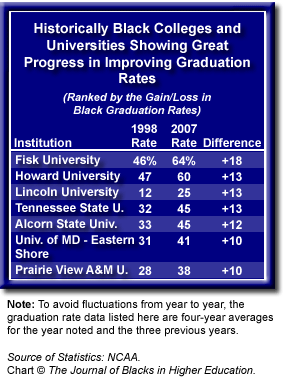
Blacks Making Little Progress in Positions That Serve as Stepping Stones to College and University Presidencies
The American Council on Education and the University Professional Association for Human Resources recently completed a survey showing the racial breakdown of people in senior-level positions at colleges and universities. These are the posts from which a large percentage of the next generation of college and university presidents will come.
The results of the survey are very disappointing. The data shows that in 2006 blacks made up 5.9 percent of all people in posts such as executive vice president, provost, and academic deans. This is just barely above the level blacks had achieved two decades ago. In 2006 blacks were 5 percent of all college and university provosts, the post that is most likely to lead to a college presidency.
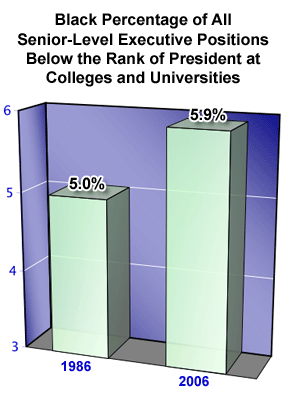
Black College Students in Texas Rally to Protect Their Voting Rights
 The March 4 Democratic primary in Texas is shaping up to be an important contest to decide whether Barack Obama or Hillary Clinton will be the party’s nominee. In recent primaries Obama has won between 80 percent and 90 percent of the black vote. Therefore, Obama supporters in Texas are looking to turn out large numbers of black voters. The March 4 Democratic primary in Texas is shaping up to be an important contest to decide whether Barack Obama or Hillary Clinton will be the party’s nominee. In recent primaries Obama has won between 80 percent and 90 percent of the black vote. Therefore, Obama supporters in Texas are looking to turn out large numbers of black voters.
In past elections, students at Prairie View A&M University, the historically black educational institution in Texas, have had difficulty casting their votes in Waller County. Officials claimed that students at the university were ineligible to vote in the county unless their permanent homes were located there. The courts disagreed. But in 2006 hundreds of students at the university were turned away from the polls because election officials had declined to add them to the voter rolls.
In January the Waller County Commission said that it would open only one “early voting” polling place in the county which is more than seven miles from campus. It had earlier said there would be six sites, including one adjacent to the Prairie View campus. After students planned a massive march and the U.S. Justice Department questioned the reductions of early voting sites, the county commission added three early voting polling places including one in Prairie View.
Alabama State University President Joe Lee to Step Down
 Joe A. Lee, who has served as president of Alabama State University for the past seven years, will resign his position effective May 31. Lee’s tenure at the historically black educational institution in Montgomery has been controversial as several audits had found financial irregularities at the university. Joe A. Lee, who has served as president of Alabama State University for the past seven years, will resign his position effective May 31. Lee’s tenure at the historically black educational institution in Montgomery has been controversial as several audits had found financial irregularities at the university.
But Lee also presided over an era of growth for the university. Enrollments reached an all-time high and $125 million in new construction was added to the campus.
Prior to coming to Alabama State, Lee served as president of Tougaloo College in Jackson, Mississippi. He is a graduate of Talladega College and holds a master’s degree and a doctorate in educational administration from Miami University.
Few Blacks in Top Administrative Posts at the University of Virginia
 Among the nation’s highest-ranked educational institutions, the University of Virginia has been a leader in student and faculty diversity. But a new report by William B. Harvey, the university’s vice president for diversity and equity, says UVA has done a poor job in bringing blacks into top administrative positions. Among the nation’s highest-ranked educational institutions, the University of Virginia has been a leader in student and faculty diversity. But a new report by William B. Harvey, the university’s vice president for diversity and equity, says UVA has done a poor job in bringing blacks into top administrative positions.
According to the report, of the 436 top administrators at the University of Virginia, only 28, or 6.4 percent, are black. The university’s medical school has done the best job. There, four of the 35 top administrators are black.
According to the American Council on Education, blacks make up 9.7 percent of all full-time college administrators nationwide.
There is some hope that the situation will improve in the months ahead. The University of Virginia currently has eight openings for senior-level management positions. Black candidates are among the four finalists for the position of dean at the nursing and law schools as well as at the College of Arts and Sciences. There is also a black finalist in the search to fill an opening for vice president for research.
In Memoriam
Alberta Turner (1909-2008)
Alberta Turner, long-time university professor and civil rights activist, has died at the age of 98 in Hilo, Hawaii. Turner was a member of the faculty at Wilberforce University, Bennett College, and Ohio State University. She is believed to be the first African American to earn a Ph.D. in psychology from Ohio State.
Turner began her career as an activist by showing up at the all-white prom put on by her high school in 1925. She was active in the civil rights movement for the next several decades.
Turner also served as president of Jack and Jill of America, a national organization that is an advocate for black youth.
Awards
• George Harrison Evans received the Human Rights Medal from North Carolina A&T State University, the historically black educational institution in Greensboro. Dr. Evans, who is 100 years old, is a graduate of Meharry Medical College. He maintained a medical practice in Greensboro for 47 years and was a major player in the city’s civil rights struggles.
• Bertrade Mbom, a native of Cameroon who is a senior at Carnegie Mellon University, was awarded the Gilliam Fellowship for Advanced Study from the Howard Hughes Medical Institute. The fellowship provides full support for up to five years of study leading to a doctorate in the sciences.
• On March 6 Geoffrey Canada, president of the Harlem’s Children Zone, will be presented with the Austin College Leadership Award at ceremonies in Dallas, Texas. The award comes with a $100,000 cash prize.
Grants
• Rust College, the historically black educational institution in Holly Springs, Mississippi, received a $1.5 million grant from the Kresge Foundation. The college has earmarked the grant for the construction of the new Hamilton Science and Mathematics Center on campus and the renovation of the current McDonald Science Hall.
• Florida A&M University’s School of Nursing received a $150,000 grant from the Florida Department of Education. The funds will be used to admit 20 additional undergraduate students to the nursing school.
|
Study Finds That the Racial Gap in Educational Attainments Has a Major Negative Impact on Upward Economic Mobility
 The Economic Mobility Project, funded by the Pew Charitable Trusts, recently released a report authored by three scholars from The Brookings Institution. The report deals with a wide range of topics regarding economic mobility with one chapter concentrating on African Americans. The Economic Mobility Project, funded by the Pew Charitable Trusts, recently released a report authored by three scholars from The Brookings Institution. The report deals with a wide range of topics regarding economic mobility with one chapter concentrating on African Americans.
The study found that over the past 35 years there has been no closing of the income gap between blacks and whites. Furthermore, the results showed that blacks ages 30 to 39 are less likely than similarly aged whites to have higher incomes than their parents.
One of the major factors contributing to a lack of upward economic mobility among African Americans is the continuing large gap in educational attainments.
The report can be downloaded by clicking here.
  |
“Barack Obama is changing the way we think about race. His inclusive message is so refreshing that, in addition to strong backing from blacks, he is drawing unprecedented nationwide support from white voters. It is so upsetting that this remarkable and historic feat is belittled as a ‘cult of personality.’”
— William Julius Wilson, professor of sociology and social policy at Harvard University, in The New York Times, February 13, 2008
|
High School Students Believe the Most Famous Americans Are Black
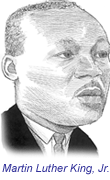 Researchers at Stanford University and the University of Maryland asked 2,000 high school students to write down the names of the most famous Americans from the days of Columbus to the present time. The students were told not to include people who served as president of the United States or their wives. Researchers at Stanford University and the University of Maryland asked 2,000 high school students to write down the names of the most famous Americans from the days of Columbus to the present time. The students were told not to include people who served as president of the United States or their wives.
Among the top 10 most mentioned Americans, four were black. What was most surprising to researchers was that the three most mentioned Americans were black: Martin Luther King Jr., Rosa Parks, and Harriet Tubman. Oprah Winfrey was in seventh place ahead of Marilyn Monroe and Thomas Edison.
The authors of the study, which appears in the March issue of The Journal of American History, point out that many of today’s high school teachers grew up during the civil rights era and therefore assign it great importance.
University of Missouri Establishes Online Hate Crime Reporting System
 Students at the University of Missouri can now access a Web site where they can anonymously report hate crimes or other bias-related incidents on campus. Victims of or witnesses to hate crimes are encouraged to use the site. The university is now working to make students more aware of the site and encouraging them to use it if a bias incident occurs. Students at the University of Missouri can now access a Web site where they can anonymously report hate crimes or other bias-related incidents on campus. Victims of or witnesses to hate crimes are encouraged to use the site. The university is now working to make students more aware of the site and encouraging them to use it if a bias incident occurs.
According to the university police force, there have been no hate crimes on campus since 2004. There are more than 21,000 undergraduate students on campus, 6 percent of whom are black.
The Black-White Cultural Divide Persists Even for College Graduates
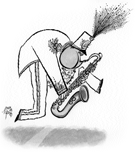 Last week JBHE reported a wide racial divide in attendance at and participation in cultural events such as the theater, opera, the ballet, art shows, and classical music performances. Generally these activities are associated with people who have a higher education. So, considering the large racial gap in educational attainments, it is no surprise that whites participate in these events more than blacks. Last week JBHE reported a wide racial divide in attendance at and participation in cultural events such as the theater, opera, the ballet, art shows, and classical music performances. Generally these activities are associated with people who have a higher education. So, considering the large racial gap in educational attainments, it is no surprise that whites participate in these events more than blacks.
But when we break down the data by educational attainment, we see a large racial gap remains for blacks and whites who have completed a four-year college degree. White college graduates are more than twice as likely as African-American college graduates to attend a classical music performance or the opera. The racial gap in attendance at the ballet is even wider. White college graduates are more than three times as likely as blacks with the same level of education to attend the ballet. White college graduates were also more likely than similarly educated blacks to attend the theater, an art museum, or art fairs. Whites are also more likely to visit historical sites or to read literature.
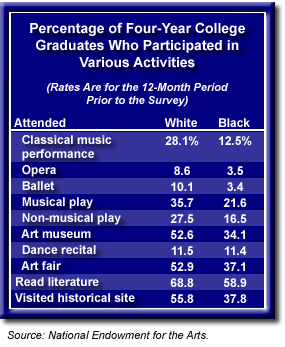
  |
67 Number of African Americans nationwide in 2004 who earned bachelor’s degrees in biochemistry.
22 Number of African Americans in 2004 who earned bachelor’s degrees in biochemistry at the University of Maryland Baltimore County.
source: University of Maryland Baltimore County
|
UCLA Study Finds That Comprehensive Review Admissions Systems at the University of California Are Failing to Admit Adequate Numbers of Black Students
The Ralph J. Bunche Center for African American Studies at the University of California at Los Angeles recently released a new report examining the admissions procedures at the undergraduate campuses of the University of California. Due to state law, admission to these public universities is conducted on a race-neutral basis. But most campuses have now employed a holistic approach called comprehensive review. This entails looking not only at an applicant’s high school grades and standardized test scores but also at leadership, community service, creativity, and success in overcoming disadvantage.

The Bunche Center report examines the admissions procedures at each campus. The survey found that each campus is committed to considering nontraditional measures of merit. Yet, particularly at the most prestigious campuses in the system, black enrollments remain at a level well below the level that existed prior to the enactment of the affirmative action ban.
The authors of the report conclude that admissions officers at the undergraduate campuses of the University of California are not making adequate efforts to account for the disadvantages faced by blacks and other minority youths. The admissions officers at these institutions, according to the report, continue to rely too heavily on standard measures of academic merit.
The report, entitled Gaming the System: Inflation, Privilege, and the Under-Representation of African-American Students at the University of California, can be downloaded by clicking here.

MASSACHUSETTS INSTITUTE OF TECHNOLOGY

Dean for Student Life
The Massachusetts Institute of Technology (MIT) seeks a student affairs leader, adept at both strategy and operations, to serve as its new Dean for Student Life. Intellectually challenging and strikingly practical, MIT attracts and has high regard for students who are independent and entrepreneurial. For the last decade, MIT has committed itself to an educational vision that ensures that students’ experience of MIT as a community reaches the same high standard as its academics and research. Building on significant recent gains, the Dean for Student Life will play a pivotal role in shaping and extending this vision, overseeing efforts to integrate living and learning at the Institute.
Reporting to the Chancellor, working in close collaboration with the Dean for Undergraduate Education and the Dean for Graduate Students, the Dean for Student Life has responsibility for an annual operating budget of approximately $90 million, and a workforce of 465 Institute staff. The Dean is a senior advisor to the President on issues affecting the student experience and serves as a member of the Academic Council. The Division of Student Life consists of seven units: Student Development; Student Support; Residential Life, Athletics, Physical Education & Recreation; Community Development & Substance Abuse; Religious Life; and Administration.
This is a tremendous opportunity to join MIT, serve its students as an inspiring advocate, and lead the Institute’s efforts to provide the very best student experience. The successful candidate will be the dean for students first and foremost, but will also bring the skills and experience necessary to manage a large budget and complex business enterprises.
Inquiries, nominations, and applications should be sent in confidence to Isaacson, Miller at 3567@imsearch.com.
MIT is an equal opportunity/affirmative action employer: women and minorities are encouraged to apply.

Wichita State University Obtains the Gordon Parks Collection
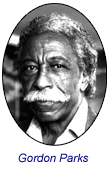 Wichita State University has announced that it will be the repository for the papers of Gordon Parks. A true Renaissance man, Parks is best known for his photography. But he was also successful at poetry, painting, films, journalism, fiction writing, and musical composition. Parks, a native of Kansas, died in 2006 at the age of 93. Wichita State University has announced that it will be the repository for the papers of Gordon Parks. A true Renaissance man, Parks is best known for his photography. But he was also successful at poetry, painting, films, journalism, fiction writing, and musical composition. Parks, a native of Kansas, died in 2006 at the age of 93.
The Parks collection to be housed at Wichita State includes more than 150 boxes of documents, photographs, and other papers. Included are drafts of unpublished manuscripts, notes, and an early version of the script for the movie Shaft. University archivists believe that the boxes of materials will contain numerous surprises including unpublished poems and other original material.
The university made a payment of $505,500 to the Gordon Parks Foundation in order to secure the collection. It will take two years for the university to sort through and archive the materials before they will be available for scholarly research.
Lawsuit Seeks to Steer More Funds to Maryland’s Historically Black Universities
 The Coalition for Equity and Excellence in Maryland Higher Education has filed a federal lawsuit seeking to end several academic programs at five predominantly white state universities in Maryland. The funds would then be directed to similar programs at the state’s four historically black universities. The Coalition for Equity and Excellence in Maryland Higher Education has filed a federal lawsuit seeking to end several academic programs at five predominantly white state universities in Maryland. The funds would then be directed to similar programs at the state’s four historically black universities.
The lawsuit seeks to dissolve the following academic programs, which the coalition claims duplicate and unnecessarily compete with programs at the black universities:
• All new undergraduate programs for first- and second-year students at the University of Baltimore. Previously the university only offered classes for junior and senior transfer students and for graduate education.
• Master’s and doctoral programs in engineering at the University of Maryland-Baltimore County.
• Graduate programs in public health at the University of Maryland-Baltimore.
• Undergraduate programs in exercise science, marketing, business, and computer science at Salisbury University.
• The MBA program that is run jointly by the University of Baltimore and Towson State University.
Appointments
 • Bruce Lewis was promoted to associate vice president for public safety at Northwestern University. He was the chief of the university’s police force. • Bruce Lewis was promoted to associate vice president for public safety at Northwestern University. He was the chief of the university’s police force.
Lewis is a graduate of the University of Southwestern Louisiana. He holds a master’s degree in criminal justice from Grambling State University and is enrolled in the Ph.D. program in public administration at the University of Illinois at Chicago.
 • Robert E. Taylor was appointed dean of the Howard University College of Medicine. He has served as chair of the medical school’s department of pharmacology since 1992. He also is director of the Howard University Alcohol Research Center. • Robert E. Taylor was appointed dean of the Howard University College of Medicine. He has served as chair of the medical school’s department of pharmacology since 1992. He also is director of the Howard University Alcohol Research Center.
Dr. Taylor is a graduate of Butler University. He holds a Ph.D. in pharmacology/toxicology from Purdue University. He received his medical training at Vanderbilt University.
 • Sonia BasSheva Mañjon was named vice president for diversity and strategic marketing at Wesleyan University in Middletown, Connecticut. She will assume her duties at the end of the current academic year. Mañjon is currently director of the Center for Art in Public Life at the California College of the Arts in Oakland. • Sonia BasSheva Mañjon was named vice president for diversity and strategic marketing at Wesleyan University in Middletown, Connecticut. She will assume her duties at the end of the current academic year. Mañjon is currently director of the Center for Art in Public Life at the California College of the Arts in Oakland.
Dr. Mañjon is a graduate of UCLA. She holds a master’s degree in cultural anthropology and a Ph.D. in the humanities from the California Institute of Integral Studies.
 • Judy “J.J.” Jackson was named vice president for institutional diversity at the University of Kentucky. She is currently dean of the college at Vassar College in Poughkeepsie, New York. Dr. Jackson will assume her new duties on July 1. • Judy “J.J.” Jackson was named vice president for institutional diversity at the University of Kentucky. She is currently dean of the college at Vassar College in Poughkeepsie, New York. Dr. Jackson will assume her new duties on July 1.
Jackson is a graduate of the University of North Carolina at Greensboro. She holds a master’s degree in Francophone African literature, geography, and foreign policy from Bucknell University and a doctorate from the Harvard University Graduate School of Education.
 • Thaddeus McEwen, associate professor of business administration and director of the Interdisciplinary Center for Entrepreneurship and E-Business at North Carolina A&T State University, was elected chair of the Minority and Women Entrepreneurship Division of the United States Association for Small Business and Entrepreneurship. • Thaddeus McEwen, associate professor of business administration and director of the Interdisciplinary Center for Entrepreneurship and E-Business at North Carolina A&T State University, was elected chair of the Minority and Women Entrepreneurship Division of the United States Association for Small Business and Entrepreneurship.
|
 .
.